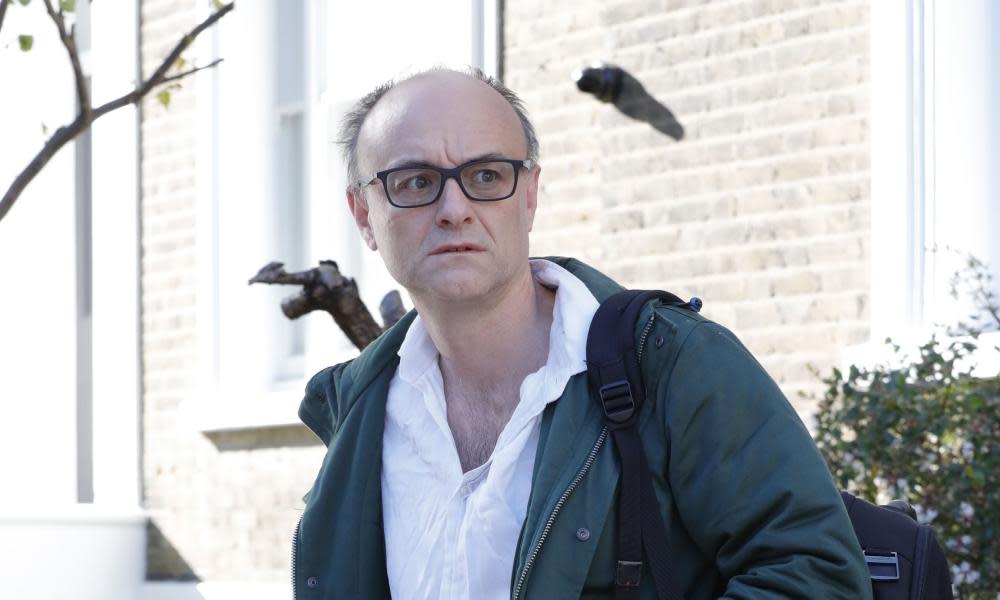Dominic Cummings to continue to take active role in government

Last month, rumours across Whitehall had it that Dominic Cummings might take a less prominent role in No 10 following the humiliation of having to confess that he had travelled to Durham during lockdown. Instead, he appears to be front and centre again.
He and the cabinet minister Michael Gove have overseen the departure of Sir Mark Sedwill, the government’s most senior civil servant; folded the Department for International Development into the Foreign Office; made plans to cut the government communications team of 4,500 people across more than 20 departments; and introduced a White House-style plan for televised briefings.
There is more to come, say insiders. Following Wednesday’s announcement that Cummings has been granted permission to visit five of the UK’s top secret security sites ahead of the looming integrated review, he will have a role cutting waste in the ministry of defence.
Dave Penman, the general secretary of the FDA union which represents the UK’s most senior civil servants, said: “Dominic Cummings may or may not have the answers to the government’s and the country’s woes, but what appears increasingly clear is that the centralisation of power and policy is the means by which the prime minister intends to execute it.”
Cummings’ re-emergence has brought a sense of relief to some close to Downing Street. One source said: “It’s a bit like swimming with a shark – when you can see his fin, at least you know where he is.”
Cummings’s projects
Defence
Cummings has written extensively about the need to stop wasteful spending in the Ministry of Defence, a department regularly criticised by the National Audit Office for failing to deliver multi-billion-pound schemes on time or within budget.
Articles on his blog have argued in favour of using artificial intelligence and drone technology as opposed to traditional defence equipment.
So Whitehall officials may be concerned to see that he appears to be spearheading Johnson’s review of armed forces spending.
Any attempt to cut the budget or the personnel will face opposition from the military’s top brass and their supporters on the Conservative backbenches.
Air capture
Buried in the detail of Rishi Sunak’s summer statement on Wednesday was £100m of taxpayer backing for a leading-edge green technology known as “direct air capture”.
It involves removing carbon dioxide from the air and compressing it into a form that can then be buried or stored. Cummings is enthusiastic about the technology, colleagues say– as is another government adviser, Tim Leunig– hoping the UK could become a world leader in it.
It’s just one example of the government’s willingness to take bets on R&D with public money and one definition of what Johnson meant when he repeatedly promised to “unleash Britain’s potential” during the election campaign.
Cummings is pushing through the creation of a UK version of Darpa, the US Defense Advanced Projects Research Agency, set up under Eisenhower in the 1950s, which backs new technologies and helped support the creation of technologies including the internet and GPS. The budget in March earmarked £800m to create the organisation, described as a “blue skies” science research agency.
Communications
Sajid Javid resigned during the February reshuffle, when he was told that his special advisers – including those dealing with the media – would be combined with No 10’s. Afterwards he joked that he wouldn’t comment on “Cummings and goings” – acknowledging the role of Johnson’s right-hand man in his departure.
Last week it became clear that the change was just the beginning of a dramatic reorganisation of government communications, which will put Downing Street in the driving seat.
While Cummings remains the lightning rod for criticism, the shakeup is as much the brainchild of Johnson’s director of communications, Lee Cain.
Scores of departmental civil service press officers will see their jobs disappear, and those who remain will be line-managed by the Cabinet Office, instead of their own, home departments. Johnson’s team are scathing about the quality of some Whitehall press offices and want to centralise and standardise the messages emerging from government. Critics say it is a further blow to the independence of cabinet ministers.
Recruiting scientists – and weirdos
The government announcement on Wednesday, that it had created a new Office for Talent based in No 10 as a way to help leading scientists, researchers and others live and work in the UK, will come as little surprise to those who have observed Cummings closely. His obsession with bringing in scientists and outside talent into the orbit of No 10 has been a striking feature of Johnson’s seven-month tenure.
In January, Cummings wrote a rambling blog calling for “weirdos and misfits with odd skills” to apply for new jobs in No 10. He wanted data scientists, economists, policy experts, project managers, communication experts and junior researchers, one of whom would become his personal assistant.
Superforecasting
Special advisers, whose contracts have been changed to give No 10 more power over their jobs, have been ordered by Cummings to read books promoting superforecasting as part of a training regime he arranged for the summer.
At a recent briefing, they were told to read the 350-page book Superforecasting: The Art and Science of Prediction by Philip Tetlock and High Output Management by Andrew Grove, which claims that “only the paranoid survive”.
Cummings’ obsession with superforecasting, which examines how historical patterns can be used to make accurate predictions, was blamed for his recruitment of Andrew Sabisky, who calls himself a “superforecaster”. He was recruited to No 10 earlier this year but quickly stood down after it was disclosed that he had previously praised eugenics and argued that intelligence was inherited.


